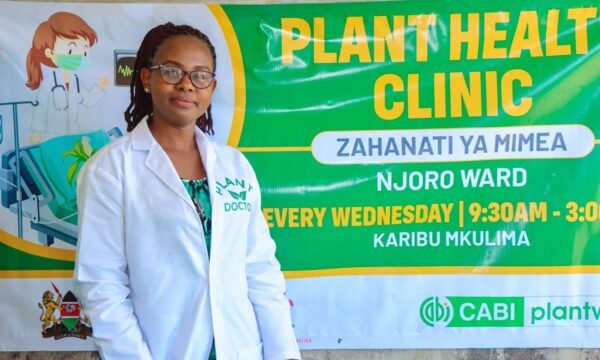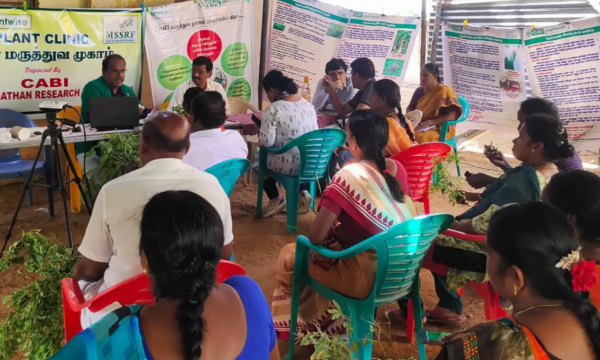
E-plant clinic in Inhambane Province, Mozambique (© CABI)
E-plant clinics have been successfully launched in Mozambique this November, following two trainings and official launches. The trainings took place in a village called Tenga, Moamba near the capital city of Maputo (around 80 km), and in Morrumbene District near the city of Inhambane.
Training was delivered in partnership with the National Directorate of Agricultural Extension (DNEA), an institution of the Ministry of Agriculture in Mozambique.
What are e-plant clinics?

Farmer receiving advice at an e-plant clinic in Inhambane Province, Mozambique (© CABI)
Plant doctors (extension workers) run plant clinics where farmers bring along crops which are affected by various pests and diseases. At the clinics, the farmers receive advice on how to prevent, monitor, manage and control crop problems.
In order to capture data such as type of pest, symptoms, type of crop, and recommendations, plant doctors fill in a paper prescription form. The data on this form is then entered into a secure database called the Plantwise Online Management System (POMS) where it can be analysed.
A plant clinic becomes an e-plant clinic when plant doctors use a data collection app on a tablet instead of filling out a paper prescription form. There are substantial advantages to integrating tablets into plant clinics, including:
- Stakeholders receive the data far more quickly, slowing them to rapidly respond to threats
- Plant doctors give higher quality recommendations, using adaptable reference material installed on their tablets
- Chat groups enable plant doctors to ask each other for advice
- More advice is given to farmers per clinic session
- Tablets streamline the data collection resource delivery process
To find out more about the benefits of e-plant clinics you can read our Supporting Plantwise with Digital Technologies report.
How did the training go?

Farmer receiving advice at an e-plant clinic in Inhambane Province, Mozambique (© CABI)
In Moamba, 10 plant doctors were presented with their tablets by Sandra Silva the Director of Extension Services. In her opening speech, she talked about the tablets opening new channels of communication for plant doctors and acting as a vital tool for delivering plant health extension services.
The training went very well, in part because most of the plant doctors were familiar with the basics of how to use tablets due to having smartphones. We explained to them the benefits of e-plant clinics and demonstrated how to use the data collection app. The Plantwise Factsheet app was also highlighted as a useful tool for finding recommendations to copy and paste into the data collection app. Furthermore, Plant doctors were also shown how to an online chat group to request management information and share photos and advice about the problem.

Farmers welcoming plant doctors to a new e-plant clinic with songs, in Moamba, Mozambique (© CABI)
The day after the training, the first e-plant clinic was launched in a local farming community. We were warmly greeted by the farmers who sang songs to welcome us. The launch was a success and plant doctors gained confidence with using the tablets.
What did we learn at the clinic?
At the clinic, we heard that the farmers were waiting for the first rains of the seasons which were due very soon. We were told that irrigation was the greatest challenge, particularly without any irrigation equipment. Not only do crops struggle to grow without water, the crops cannot grow strong enough to defend themselves against crop pests and diseases, some of which thrive in dry conditions.

Chilo partellus (spotted stem borer) found on maize (© CABI)
One of the pests we saw was Chilo partellus, spotted stem borer, on corn, which is sometimes mistaken for Spodoptera frugiperda, fall armyworm, a very serious pest which could cause maize losses costing 12 African countries up to US$6.1 billion per annum, unless control methods are urgently put in place (see Fall Armyworm: Impacts and Implications for Africa). Other crop problems included a mosaic disease of cassava and a lepidopteran species on cabbage.
We also noticed that there were not many young people or men working on the farms because they increasingly work in the towns and cities. This is a common problem for farming communities in developing countries across the globe and raises the question “Who will carry on farming the land once the older workers are no longer able to do so?”.
After exchanging thank yous with the farmers (“Khanimambo” in the local language) we left for the next training in Inhambane, in the hope that the farmers will soon benefit from the newly launched e-plant clinics. We will keep an eye on the progress of the e-plant clinics and look forward to receiving the first batch of e-plant clinic data.
Related News & Blogs
How plant clinics are strengthening crop health services in Bangladesh
When the first-ever plant clinic in Bangladesh opened in Dhaka in 2013, it initially faced a lack of interest due to its novelty and limited awareness among farmers. However, it went on to expand, providing advice to over 17,000 farmers and led to the…
2 July 2025




